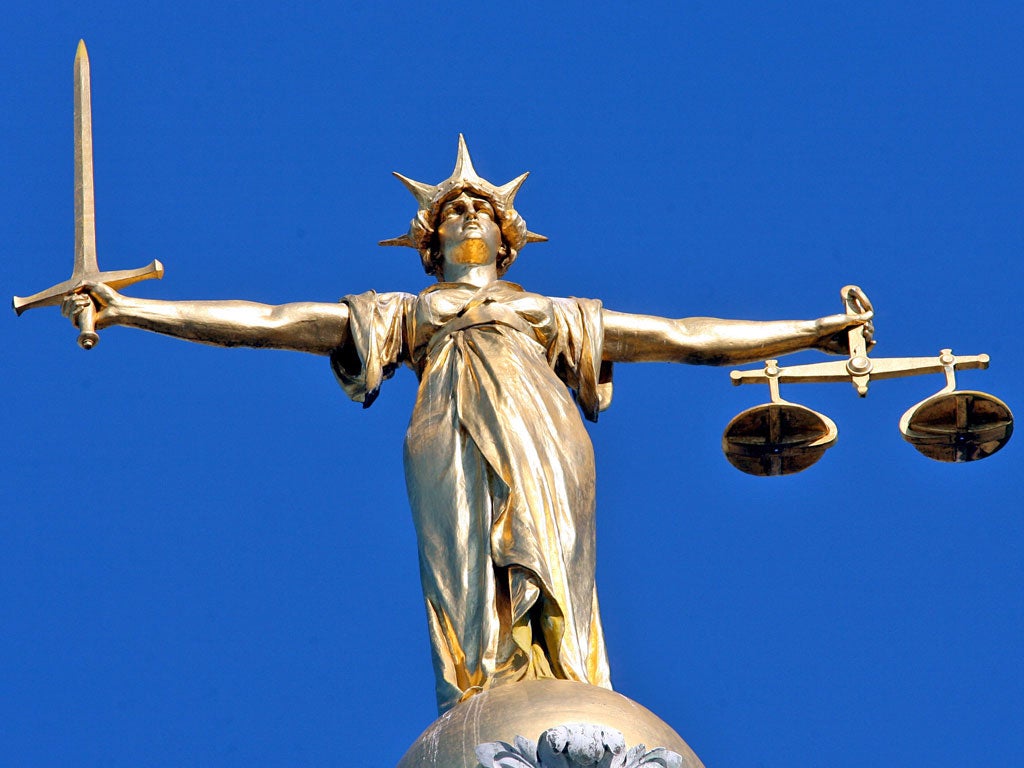Two jurors jailed for contempt of court over use of internet during trials
One posted Facebook comments that he wanted to 'F*** up a paedophile' and the other Googled a case

A juror dropped from the trial of an alleged sex offender after posting on Facebook that he wanted to “F*** up a paedophile” has been jailed for two months after being found guilty of contempt of court.
Kasim Davey, 21, from Palmers Green, north London, said there was “a lot of Jimmy Savile news at the time” and he sent the Facebook message as a result of “spontaneous surprise at the kind of case I was on”.
A second juror, Joseph Beard, 29, was also found guilty of contempt by using the internet to research the case he was sitting on as a juror at Kingston Crown Court.
He was also jailed for two months, and both men must serve half their sentences behind bars.
Sir John Thomas, president of the Queen's Bench Division, used the cases to send out a warning to jurors generally that “immediate custodial sentences are almost inevitable in cases of this kind”.
Tearful families watched as both men were sentenced after being prosecuted by the Attorney General Dominic Grieve for "interfering with the administration of justice" through their internet activity.
Both were allowed 15 minutes with their loved ones before the court tipstaff led them away to the cells at the Royal Courts of Justice.
Later, the Attorney General said: "Jurors who use the internet to research a case undermine justice.
"It creates a risk that the defendant will be convicted or acquitted, not on the evidence, but on unchallenged and untested material discovered by the juror.
"Equally, the case of Kasim Davey shows that jurors must follow the directions given to them by the trial judge not to discuss the case outside the jury room, including discussions and posts on the internet."
Davey posted to his 400 Facebook friends: "Woooow I wasn't expecting to be in a jury Deciding a paedophile's fate, I've always wanted to F*** up a paedophile & now I'm within the law!"
A judge at Wood Green Crown Court was alerted and, last December, Davey was discharged from the retrial of Adam Kephalas, who was later convicted of sexual activity with a child.
Sir John and Mr Justice Sweeney said they rejected as "untruthful" Davey's assertion that his message was not meant seriously.
They said the message made clear to his Facebook friends "that he would use his prejudices in deciding the case".
They added: "The choice of the term 'f*** up' underlined his disregard of the duties he had undertaken as a juror".
The second juror, Joseph Beard, 29, was found to be guilty of contempt by using the internet to research the case he was sitting on as a juror at Kingston Crown Court to find out how many witnesses there might be.
The jury was trying two men accused of conspiracy to defraud and money laundering last year.
The trial started on October 2 but ended on November 9 when the jury was discharged after his activities came to light.
The judges said they accepted the evidence that he had done research via Google and discovered a figure of about 1,800 investors being involved in the alleged fraud he was trying.
He had done so because of frustration over lengthy delays in the trial process.
But the court heard his actions had cost him dear. He had a daughter aged nearly two and had married his wife in June, said his counsel John Cooper QC.
He needed to be back at work to earn money to pay for the wedding, but his foolish actions meant that he would now lose his job.
The judges said: "We are sure that he knew that using the internet to find out information about the case was something he should not do."
They said they had little doubt that Beard felt pressure to return to work.
Although this might explain why he deliberately breached the directions of the judge, "it does not excuse in any way his conduct as he knew full well that conducting research on the internet was an interference with the administration of justice and intended by him to be such".
The defendants in the original trial, Ian Macdonald and David Downes, faced a retrial and were convicted in March. They were jailed for eight years and four-and-a-half years respectively on April 18.
In a postscript to the judgment, Sir John said that "every attempt is made to try and warn jurors not to use the internet or social sites for any purpose in relation to the case".
He added: "However, as is also clear, the language used is not consistent, giving room for argument of the type advanced before us as to what a juror might understand was prohibited."
Sir John said: "Many judges have adopted the practice not only of warning the jury in terms similar to what the judges in these two cases did, but also handing the jury a notice setting out what they must and must not do, and the penal consequences of any breach.
"They have done this so that no juror can subsequently claim that he or she did not understand what they should not do, and what the consequences might be."
The judge said the court proposed to invite the Criminal Procedure Rules Committee in consultation with the Judicial College to "review the terminology used in the material given to the jury" and to consider whether to recommend that the practice of handing out a notice as well as the warning "should be universally followed".
PA
Bookmark popover
Removed from bookmarks